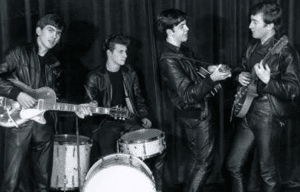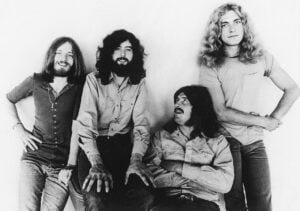11 Infamous Feuds In Rock Music History From The Beach Boys to Pink Floyd

via 𝚃𝙷𝙴 𝙱𝙾𝙾𝚃𝙻𝙴𝙶 𝙼𝙰𝚃𝚁𝙸𝚇 / YouTube
You don’t have to be close friends to make music together—but being enemies makes it a lot harder. In rock history, some of the most famous bands have had deep rifts between their members. These arguments sometimes ended in lawsuits, broken friendships, or public fights. In many cases, the tension even fueled their creativity. This list focuses on famous band feuds that made headlines, affected careers, and still interest fans to this day—from family conflicts to lawsuits between longtime partners.
The Beach Boys
View this post on Instagram
Mike Love and Brian Wilson may have shared family ties and musical success, but behind the scenes, their relationship was tense. Over the years, Love described Wilson as unstable, while Wilson often dismissed Love as selfish and controlling. Their musical visions clashed many times.
In the 1990s, Mike Love sued Wilson for songwriting credits, claiming he had not been properly recognized for his work on many of the group’s biggest songs. The case ended in Love’s favor. Despite brief reunions, the tension between them never fully healed. Their conflict is one of rock’s longest-running family disputes.
The Everly Brothers
View this post on Instagram
Don and Phil Everly were known for their close vocal harmonies, but their relationship as brothers was deeply strained. Offstage, they argued constantly, and the pressure built up over time. Things finally exploded during a show in California in 1973.
Phil smashed his guitar and walked offstage, leaving Don to finish the show alone. The group broke up immediately after the event. Although they reunited a decade later for a special concert in London, the personal distance between them remained. Their feud is one of the most well-known sibling breakdowns in rock music.
Hall & Oates
View this post on Instagram
In 2023, the duo known for soft rock hits like “Rich Girl” and “Maneater” made headlines again—but not for their music. Daryl Hall filed a lawsuit and got a restraining order against John Oates. The full details weren’t shared with the public, but court papers confirmed a serious disagreement.
A year earlier, Hall gave hints of the rift, saying in an interview that Oates was only a business partner, not a creative one. Their last performance together was in 2022. Since then, they’ve worked separately, and fans have been left wondering whether the partnership will ever return.
The Kinks
View this post on Instagram
Ray and Dave Davies formed one of Britain’s most important rock bands, but their personal relationship was full of conflict. As brothers, they shared a bond, but their fights often turned violent. Dave once said Ray drained him emotionally and creatively, calling him a “control freak.”
Their arguments went beyond music and into deeper family issues. The Kinks officially disbanded in 1996. Over the years, there have been moments of possible reunion, but nothing permanent has come from it. Their story is often used as an example of how sibling rivalry can undo even a successful band.
Kiss
View this post on Instagram
Ace Frehley and Peter Criss were part of Kiss during its rise in the 1970s, but drug use, creative clashes, and personal issues caused both men to leave the band. Gene Simmons and Paul Stanley later criticized them publicly, calling them unreliable and hard to work with.
Things got worse in 2014 when Stanley accused the two of holding antisemitic views—an accusation Frehley denied. While there were brief reunions in the late ’90s, the relationships have remained cold. The original lineup is unlikely to play together again. Their feud has kept fans debating for years.
Journey
View this post on Instagram
Steve Perry left Journey in 1998 due to health problems and disagreements with other members. He later said he had always felt like an outsider in the band. Guitarist Neal Schon and keyboardist Jonathan Cain continued the group with a new singer, but internal tension didn’t go away.
In recent years, there have been public disputes between Schon and Cain over political differences and business decisions. Lawsuits were filed involving control of the band’s finances. While Journey still tours, the infighting has left a mark on their legacy. Perry has not returned, and it seems unlikely he will.
Oasis
View this post on Instagram
The Gallagher brothers—Noel and Liam—are known for creating some of the biggest songs of the ’90s. But their constant arguing eventually tore Oasis apart. After a backstage fight in 2009, Noel quit the band, ending their run as one of Britain’s most successful groups.
Since then, they’ve insulted each other in interviews, online posts, and even through song lyrics. Despite fans hoping for a reunion, the two have shown no interest in repairing their relationship. As of 2025, a reunion is rumored, but past attempts have failed due to continued personal issues between the brothers.
Pink Floyd
View this post on Instagram
Roger Waters and David Gilmour have had a hostile relationship since the 1980s. After Waters left Pink Floyd in 1985, he tried to stop the others from using the band name. A court ruled against him, which led to decades of anger and public arguments.
In 2023, Gilmour’s wife Polly Samson made harsh claims about Waters online. Waters denied them and said he was seeking legal advice. Although they reunited briefly for Live 8 in 2005, tensions have only grown since. Today, they rarely speak, and Pink Floyd remains split into two separate legacies.
Simon and Garfunkel
View this post on Instagram
Paul Simon and Art Garfunkel created some of the most loved songs of the 1960s, but their personal and creative tensions were always present. After breaking up in 1970, they reunited several times but never stayed together long. They argued over songwriting and control.
Their 2010 reunion ended badly when Simon said Garfunkel hadn’t told him about serious vocal problems that affected their tour. Their relationship cooled again after that. Though fans hoped for more concerts, both artists have since moved on separately. Their troubled friendship continues to shape how people remember their partnership.
The Smiths
View this post on Instagram
The Smiths broke up in 1987, but the bad blood between Johnny Marr and Morrissey didn’t stop there. Since then, they’ve exchanged insults in interviews and refused to work together again. Morrissey’s political views have also added to the tension between them.
Marr has said that he wants nothing to do with the past, while Morrissey often makes comments about the breakup. Despite many reunion offers over the years, neither side has shown serious interest. The Smiths’ story is one of unfinished business and old wounds that never healed.
Yes
View this post on Instagram
In 2008, singer Jon Anderson was too sick to tour, so the band replaced him with Benoit David. Anderson was angry that the group continued without him. In response, he formed a separate group with other former members, using the name “Yes Featuring Jon Anderson, Trevor Rabin, Rick Wakeman.”
For a time, two versions of Yes were performing at the same time. Fans were confused, and the situation led to disagreements over the band’s history and legacy. Eventually, both groups stopped touring. But the split left a divide that was never fully resolved.












